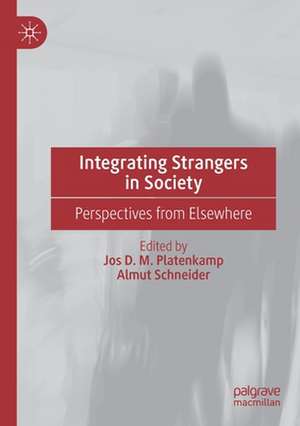Integrating Strangers in Society: Perspectives from Elsewhere
Editat de Jos D. M. Platenkamp, Almut Schneideren Limba Engleză Paperback – 14 aug 2020
| Toate formatele și edițiile | Preț | Express |
|---|---|---|
| Paperback (1) | 782.42 lei 6-8 săpt. | |
| Springer International Publishing – 14 aug 2020 | 782.42 lei 6-8 săpt. | |
| Hardback (1) | 786.10 lei 6-8 săpt. | |
| Springer International Publishing – 27 mai 2019 | 786.10 lei 6-8 săpt. |
Preț: 782.42 lei
Preț vechi: 954.17 lei
-18% Nou
Puncte Express: 1174
Preț estimativ în valută:
149.73€ • 162.59$ • 125.78£
149.73€ • 162.59$ • 125.78£
Carte tipărită la comandă
Livrare economică 22 aprilie-06 mai
Preluare comenzi: 021 569.72.76
Specificații
ISBN-13: 9783030167059
ISBN-10: 3030167054
Pagini: 229
Ilustrații: XIX, 229 p. 1 illus.
Dimensiuni: 148 x 210 mm
Greutate: 0.45 kg
Ediția:1st ed. 2019
Editura: Springer International Publishing
Colecția Palgrave Macmillan
Locul publicării:Cham, Switzerland
ISBN-10: 3030167054
Pagini: 229
Ilustrații: XIX, 229 p. 1 illus.
Dimensiuni: 148 x 210 mm
Greutate: 0.45 kg
Ediția:1st ed. 2019
Editura: Springer International Publishing
Colecția Palgrave Macmillan
Locul publicării:Cham, Switzerland
Cuprins
1. Introduction.- 2. Becoming a Sinta: learning to see dreams and relating to the dead.- 3. "You are like geese". Working and rum dancing with the Inuit elders in Nunavut (Canada).- 4. Being the otheri n Inuit society.- 5. An anthropologist in Kanaky. Modulations of belonging and otherness.- 6. A stranger-anthropologist as advocate of Māori development projects.- 7. On becoming a ritual master among the Lanten - Yao Mun - of Laos.- 8. To be made part part of Tobelo society (North Moluccas).- 9. Welcome to Tanebar-Evav - can one be incorporated in a village society?.- 10. Naming and Becoming a Munyoro in Western Uganda.- 11. Placing the newcomer - staying with the Gawigl of Highland Papua New Guinea.- 12. Mythical beings from the swamp among the Siassi, Papua New Guinea.- 13. Strangers on an industrial frontier in Eastern India.
Notă biografică
Jos D. M. Platenkamp is Professor of Social Anthropology in the Institute of Ethnology at the University of Münster, Germany.
Almut Schneider is Associate Researcher in the Department of Social and Cultural Anthropology at the Goethe University Frankfurt, Germany.
Almut Schneider is Associate Researcher in the Department of Social and Cultural Anthropology at the Goethe University Frankfurt, Germany.
Textul de pe ultima copertă
“The essays presented break a new path in the human sciences: there is not much written on the issue in focus and this perspective before. There may be bits here and there in introductory books on anthropological fieldwork, but I know of nothing that can compare with this new endeavor. This text offers an 'inverted anthropology' where what is foreign is an anthropologist coming in from abroad. This experience of acceptance of a stranger is made relevant for the more conventional debates on immigrant foreigners in various Western societies.”
—Göran Aijmer, Professor at the Gothenburg Research Institute, University of Gothenbburg, Sweden
“This book is absolutely timely, and quite unique in 'exoticizing' a debate that seems to be homemade in Europe and North America but, as the co-editors and authors show, is universal.”
—Andre Gingrich, Director of the Institute for Social Anthropology, Austrian Academy of Sciences, Austria
This book provides a uniquely positioned contribution to the current debates on the integration of immigrants in Europe. Twelve social anthropologists—“strangers by vocation”—reflect upon how they were taken in by those they studied over the course of their long-term fieldwork. The societies concerned are Sinti (northern Italy), Inuit (Canadian Arctic), Kanak (New Caledonia), Māori (New Zealand), Lanten (Laos), Tobelo and Tanebar-Evav (Indonesia), Banyoro (Uganda), Gawigl and Siassi (Papua New Guinea) and a township in Odisha (India). A comparative analysis of these reflexive, ethnographic accounts reveals as yet underrepresented, non-European perspectives on the issue of integrating strangers, enabling the reader to identify and reflect upon the uniquely Western ideals and values that currently dominate such discourse.
—Göran Aijmer, Professor at the Gothenburg Research Institute, University of Gothenbburg, Sweden
“This book is absolutely timely, and quite unique in 'exoticizing' a debate that seems to be homemade in Europe and North America but, as the co-editors and authors show, is universal.”
—Andre Gingrich, Director of the Institute for Social Anthropology, Austrian Academy of Sciences, Austria
This book provides a uniquely positioned contribution to the current debates on the integration of immigrants in Europe. Twelve social anthropologists—“strangers by vocation”—reflect upon how they were taken in by those they studied over the course of their long-term fieldwork. The societies concerned are Sinti (northern Italy), Inuit (Canadian Arctic), Kanak (New Caledonia), Māori (New Zealand), Lanten (Laos), Tobelo and Tanebar-Evav (Indonesia), Banyoro (Uganda), Gawigl and Siassi (Papua New Guinea) and a township in Odisha (India). A comparative analysis of these reflexive, ethnographic accounts reveals as yet underrepresented, non-European perspectives on the issue of integrating strangers, enabling the reader to identify and reflect upon the uniquely Western ideals and values that currently dominate such discourse.
Caracteristici
Enables the reader to recognize the current European modes of dealing with immigrants (or “strangers”) in society Provides a much-needed anthropological and non-European counterpoint to scholarly literature on migration Explores the position of the anthropologist as a “stranger by vocation” during long-term fieldwork
